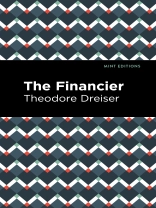The Financier (1912) is a novel by Theodore Dreiser. The first installment of Dreiser’s Trilogy of Desire, The Financier has endured as a classic of naturalist fiction and remains a powerful example of social critique over a century after its publication. Followed by The Titan (1914) and The Stoic (1947), The Financier captures the greed at the heart of the Gilded Age, a time when tycoons rose with total impunity to take over swaths of American industry. Based on the life of Charles Yerkes, an influential businessman who funded the development of railway systems in Chicago and London, The Financier is a masterpiece of twentieth century American literature that continues to resonate today. Born the son of a banker, Frank Cowperhood comes of age in a rapidly changing Philadelphia. Determined to make something at himself, he discovers his talent for purchasing goods at a low price in order to sell them for a profit to local stores. Eventually, he finds work at several local finance companies, gaining the trust of the local elite while enriching himself through dubious deals and schemes. Despite his young age, he marries a wealthy widow, cementing his status as a man of fortune. When he is caught up in an investigation into thefts from the city treasury, he is forced to rely on his hard-earned talent for grifting in order to keep himself out of prison. Through bribery, blackmail, and extortion—the means with which he made his way to the top—he attempts to lift himself from the depths of his own undoing. The Financier is a story of romance, greed, and betrayal that says as much about a single man as it does about the values of an entire society. This edition of Theodore Dreiser’s The Financier is a classic of American literature reimagined for modern readers.
Since our inception in 2020, Mint Editions has kept sustainability and innovation at the forefront of our mission. Each and every Mint Edition title gets a fresh, professionally typeset manuscript and a dazzling new cover, all while maintaining the integrity of the original book.
With thousands of titles in our collection, we aim to spotlight diverse public domain works to help them find modern audiences. Mint Editions celebrates a breadth of literary works, curated from both canonical and overlooked classics from writers around the globe.
Over de auteur
Theodore Dreiser (1871-1945) was an American novelist and journalist. Born in Indiana, Dreiser was the son of John Paul Dreiser, a German immigrant, and Sarah Maria Schanab, a Mennonite from Ohio who converted to Catholicism and was banished by her community. Raised in a family of thirteen children, of which he was the twelfth, Dreiser attended Indiana University for a year before taking a job as a journalist for the Chicago Globe. While working for the St. Louis Globe-Democrat, Dreiser wrote articles on Nathaniel Hawthorne and William Dean Howells, as well as interviewed such figures as Andrew Carnegie and Thomas Edison. In 1900, he published his debut novel Sister Carrie, a naturalist portrait of a young midwestern woman who travels to Chicago to become an actress. Despite poor reviews, he continued writing fiction, but failed to find real success until An American Tragedy (1925), a novel based on the 1906 murder of Grace Brown. Considered a masterpiece of American fiction, the novel grew his reputation immensely, leading to his nomination for the 1930 Nobel Prize in Literature, which ultimately went to fellow American Sinclair Lewis. Committed to socialism and atheism throughout his life, Dreiser was a member of the Communist Party of the United States of America and a lifelong champion of the working class.












